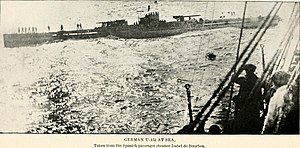SM U-151

U-151 at sea
|
|
| History | |
|---|---|
|
|
|
| Class and type: | Type U-151 U-boat |
| Name: | U-151 |
| Ordered: | 29 November 1916 |
| Builder: | Reiherstieg Schiffswerfte & Maschinenfabrik, Hamburg |
| Yard number: | 303 |
| Launched: | 4 April 1917 |
| Commissioned: | 21 July 1917 |
| Captured: | Surrendered to France at Cherbourg |
| Fate: | Sunk as target ship at Cherbourg, 7 June 1921 |
| General characteristics | |
| Class and type: | German Type U 151 submarine |
| Displacement: |
|
| Length: |
|
| Beam: |
|
| Height: | 9.25 m (30 ft 4 in) |
| Draught: | 5.30 m (17 ft 5 in) |
| Installed power: |
|
| Propulsion: | 2 × shafts, 2 × 1.60 m (5 ft 3 in) propellers |
| Speed: |
|
| Range: | 25,000 nmi (46,000 km; 29,000 mi) at 5.5 knots (10.2 km/h; 6.3 mph) surfaced, 65 nmi (120 km; 75 mi) at 3 knots (5.6 km/h; 3.5 mph) submerged |
| Test depth: | 50 metres (160 ft) |
| Complement: | 6 officers, 50 enlisted |
| Armament: |
|
| Service record | |
| Part of: |
|
| Commanders: |
|
| Operations: | 4 patrols |
| Victories: | |
SM U-151 or SM Unterseeboot 151 was a World War I U-boat of the Imperial German Navy, constructed by Reiherstieg Schiffswerfte & Maschinenfabrik at Hamburg and launched on 4 April 1917. From 1917 until the Armistice in November 1918 she was part of the U-Kreuzer Flotilla, and was responsible for sinking 37 ships.
U-151 was originally one of seven Deutschland class U-boats designed to carry cargo between the United States and Germany in 1916. Five of the submarine freighters were converted into long-range cruiser U-boats (U-kreuzers) equipped with two 15 cm (5.9 in) SK L/45 deck guns, including U-151 which was originally to have been named Oldenburg. The Type U 151 class were the largest U-boats of World War I.
U-151 was commissioned on 21 July 1917. From 21 July to 26 December 1917 she was commanded by Waldemar Kophamel who took U-151 on a long-range cruise which eventually covered a total of 12,000 miles. On 19 September 1917 U-151 claimed her first victim, the 3,104-ton French sailing ship Blanche in the Atlantic Ocean. On 2 or 12 October 1917 (sources differ), she collided with the Royal Navy Q-ship HMS Begonia in the Atlantic Ocean off Casablanca, French Morocco, sinking Begonia. On 20 November 1917 U-151 captured the steamship Johan Mjelde, and scuttled her on 26 November after transferring 22 tons of her cargo of copper.
...
Wikipedia
